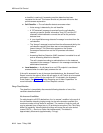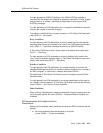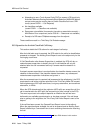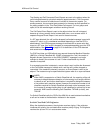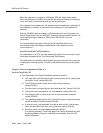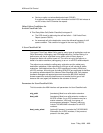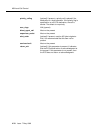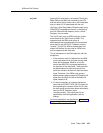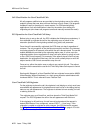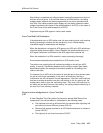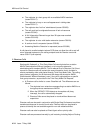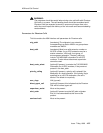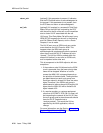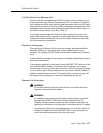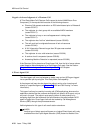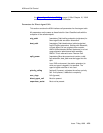
ASAI and Call Control
4-22 Issue 7 May 1998
Call Classification for User-Classified Calls
All call-progress audible tones are provided to the originating user at the calling
endpoint (except that user does not hear dial tone or touch tones). Call progress
feedback is sent to the adjunct in event reports. For OCM preview dialing
applications, final call classification is done by the station user staffing the
originating set (who hears call progress tones and manually records the result).
ECS Operation for User-Classified Call Setup
Before trying to set up the call, the ECS validates the field/options consistency. It
then attempts to originate the call for the originating user on behalf of the
extension specified in the originating address (orig_addr) call parameter.
Once the call is successfully originated, the ECS does not drop it regardless of
outcome. The only exception is the denial outcome which results in the intercept
tone being played for 30 seconds, after which the call is disconnected. The normal
audible feedback is provided to the originating station user. It is then up to the
originating station user or application to drop such calls (either by going on-hook
or via a Call Control request). For example, if the adjunct places a call to a busy
destination, the originator will be busy until he or she normally drops or until the
adjunct sends a Call Control command to drop the call.
Once set up, either the station user or adjunct may control this call. The adjunct
may then use the association used for the Third Party Make Call request to control
the call.
Starting with Release 6, a User-Classified Call can originate from a station AWOH
(Administration Without Hardware), or a hunt group extension administered with
members AWOH. This is referred to as a Phantom Call.
User-Classified Call Originator
For the originator to place the call, the originator’s set (display or voice) must have
an available call appearance for origination and must not be in the talking (active)
state on any call appearances. The originator is allowed to have a call(s) on hold
or alerting at the set.
The originator may go off-hook first, and then issue the Third Party Make Call
request. The ECS originates the call on the call appearance with dial tone.
If the originator is off-hook busy, the call cannot be placed and the request is
denied (NAK/Return Error component, cause=CS0/17 — User busy). If the
originator is unable to originate for other reasons, the ECS denies the request.
See ‘‘Negative Acknowledgement of a User-Classified Call’’ on page 4-23 in this
chapter for more detail.



